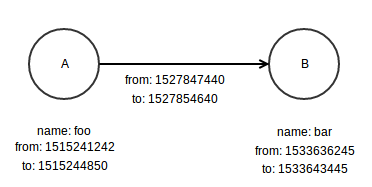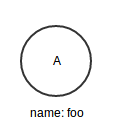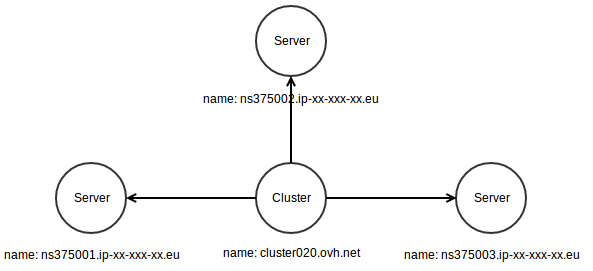Kafka¶
DepC uses Kafka to manage the graph in Neo4j. Each team has its own topic and can push messages in it using its own credentials.
Nested message¶
You can create new nodes and relationships using the following format :
{
"source": {
"label": "A",
"name": "foo",
"props": {
"from": 1515241242,
"to": 1515244850
}
},
"target": {
"label": "B",
"name": "bar",
"props": {
"from": 1533636245,
"to": 1533643445
}
},
"rel": {
"from": 1527847440,
"to": 1527854640
}
}
This message will create 2 linked nodes :

Only the source key is mandatory, it means the target, rel and props keys are optionals. So the smallest message can be the following one :
{
"source": {
"label": "A",
"name": "foo"
}
}

Flat message¶
If you Kafka client does not support the nested structure for your message, or if your prefer this form, you can also send us a flat message :
{
"source_label": "A",
"source_name": "foo",
"source_from": 1515241242,
"source_to": 1515244850,
"target_label": "B",
"target_name": "bar",
"target_from": 1533636245,
"target_to": 1533643445,
"rel_from": 1527847440,
"rel_to": 1527854640
}
The only mandatory keys are source_label and source_name.
Messages validation¶
DepC validates messages before converting them into Neo4j format. Here are the rules :
| Field | Rule | Examples |
|---|---|---|
| Label | {“type”: “string”, “pattern”: “^[A-Z]+[a-zA-Z0-9]*$”} |
MyLabel, Mylabel, My123Label |
| Name | {“type”: “string”, “pattern”: “^[!#-&(-[\]-_a-~]+$”} |
Foo, foo, foo123bar, #F$o%ob&/a-r. |
| From | {“type”: “integer”, “minimum”: 0} | 0, 100, 10000 |
| To | {“type”: “integer”, “minimum”: 1} | 1, 100, 10000 |
Example script¶
Here is a simple example in Python :
Note
First, you may need to install this dependency :
pip install kafka-python==1.4.3
import json
import os
import ssl
from kafka import KafkaProducer
conf = {
'bootstrap_servers': os.environ['DEPC_KAFKA_HOST'],
'security_protocol': 'SASL_SSL',
'sasl_mechanism': 'PLAIN',
'sasl_plain_username': os.environ['DEPC_KAFKA_USERNAME'],
'sasl_plain_password': os.environ['DEPC_KAFKA_PASSWORD'],
'ssl_context': ssl.SSLContext(ssl.PROTOCOL_SSLv23),
'ssl_check_hostname': False,
'client_id': os.environ['DEPC_KAFKA_TOPIC'],
'value_serializer': lambda v: json.dumps(v).encode('utf-8')
}
p = KafkaProducer(**conf)
message = {
"source": {
"label": "Cluster",
"name": "cluster020.ovh.net"
},
"target": {
"label": "Server",
"name": None
}
}
for name in ['ns375001.ip-xx-xxx-xx.eu', 'ns375002.ip-xx-xxx-xx.eu', 'ns375003.ip-xx-xxx-xx.eu']:
message['target']['name'] = name
p.send(os.environ['DEPC_KAFKA_TOPIC'], message)
p.flush()
The following graph will be created :
